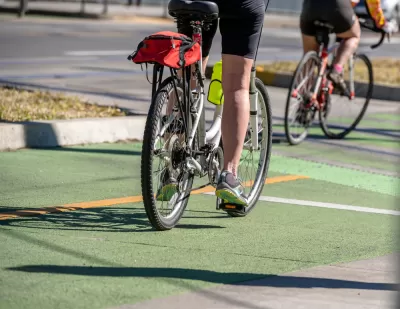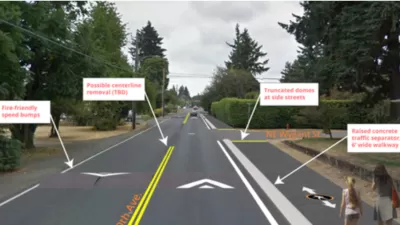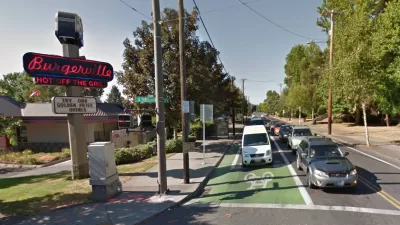BikePortland publisher and editor-in-chief Jonathan Maus took a ride along two new neighborhood greenways to report on successes and opportunities for continued improvement.

The Portland Bureau of Transportation recently completed almost seven miles of neighborhood greenway bike routes in East Portland, a part of the city that critically lacked bike infrastructure. Jonathan Maus took a bike tour of the “130s” and “HOP” projects, snapping photos along the way to illustrate the transformation.
"The lack of street grid and high speed of drivers makes every bike network investment important out there. While I focused on the crossings, what’s really great about these new greenways is how they will help people find their way between neighborhoods," Maus reflects.
The "130s," a north-south route jogging between 128th and 132nd, spans the distance between SE Foster Road and I-84 in Northeast Portland. Maus sees a new signalized crosswalk median leading to a protected bike lane at Southeast Powell Boulevard as an improvement, noting that the Outer Powell Safety Project will further improve the protected lanes. Nearing East Burnside Boulevard, "The route took me onto the sidewalk following those green dots again and then directed me over the rail tracks via a narrow sidewalk hemmed in by railings," says Maus, sharing concern about the difficulty in crossing at this intersection housing the MAX light rail.
Heading west on the "HOP" (Hassalo/Holladay-Oregon-Pacific) greenway, Maus navigated to the Gateway Transit center. "I found the eastern end of the HOP disappointing. I didn’t find any clear connection to the transit center itself. I mean, this is a major transit center and the bikeway just seemed to fizzle out," Maus says.
Among key takeaways from the ride, Maus cites inconsistencies in sidewalk routing treatments and proximity to high-speed traffic on arterials. " It doesn’t matter how good our low-stress greenways are if the crossings are high-stress. A chain is only as strong as its weakest link, remember?"
FULL STORY: Taking a ride on east Portland’s new neighborhood greenways

Maui's Vacation Rental Debate Turns Ugly
Verbal attacks, misinformation campaigns and fistfights plague a high-stakes debate to convert thousands of vacation rentals into long-term housing.

Planetizen Federal Action Tracker
A weekly monitor of how Trump’s orders and actions are impacting planners and planning in America.

In Urban Planning, AI Prompting Could be the New Design Thinking
Creativity has long been key to great urban design. What if we see AI as our new creative partner?

King County Supportive Housing Program Offers Hope for Unhoused Residents
The county is taking a ‘Housing First’ approach that prioritizes getting people into housing, then offering wraparound supportive services.

Researchers Use AI to Get Clearer Picture of US Housing
Analysts are using artificial intelligence to supercharge their research by allowing them to comb through data faster. Though these AI tools can be error prone, they save time and housing researchers are optimistic about the future.

Making Shared Micromobility More Inclusive
Cities and shared mobility system operators can do more to include people with disabilities in planning and operations, per a new report.
Urban Design for Planners 1: Software Tools
This six-course series explores essential urban design concepts using open source software and equips planners with the tools they need to participate fully in the urban design process.
Planning for Universal Design
Learn the tools for implementing Universal Design in planning regulations.
planning NEXT
Appalachian Highlands Housing Partners
Mpact (founded as Rail~Volution)
City of Camden Redevelopment Agency
City of Astoria
City of Portland
City of Laramie





























